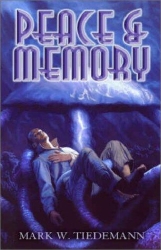I’ve been thinking deeply about the recent eruption of controversy in SFWA over sexism. Seems just about anywhere we look in the last several years there are examples of men behaving stupidly toward and about women. While this is nothing new, where it has been cropping up seems surprising.
There have been several incidents, both online and out in the world, within the skeptical community. The boys came out to try to tell the girls to get their own clubhouse and stop invading what for some reason these males had regarded as somehow the province of people with testicles. Prominent women—skeptics, humanists, atheists, scientists—have been treated to high school-level chauvinism by males intent on…
On what?
It’s worth reading this article by Rebecca Watson, one of the most prominent women in the active skeptical world. Some of what she has gone through seems totally bizarre, of the “what planet did this happen on” variety. And yet, there it is. The Thing We (people like me) Had Thought We Were Done With. Males acting like schoolyard bullies toward women, especially women who claim themselves as individuals with minds, choices, and, apparently, interests that don’t include them. The boys, that is.
Reading that, someone like me can feel pretty virtuous. “I don’t think that way! I don’t do that! The people I hang with don’t, either, we’ve outgrown adolescence and never were that gauche!” We might feel that way and some of us might even be justified.
But not all of us.
I’ve been a science fiction reader practically all my life. I’ve been a professional SF writer since 1990, therefore a member of SFWA. I have credited science fiction, my early exposure to it, as reason for my awareness of gender issues, my embrace of feminisim, and certainly my affiliation with skepticism, rationality, and—may I say it?—humanist morality. The circles in which I move resonate with all this as well and over decades a kind of blanket of comforting isolation has settled around me that has buffered me from some of the kinds of bullshit that has evidently been there all along.
There’ve been several instances of sexism over the last few years within the science fiction community, some at an apparently low-level, others fairly significant, culminating in the current Matter At Hand over a series of articles in the SFWA Bulletin (as well as a cover painting for one issue) and the responses prompted concerning them.
Disclaimer: I tend to ignore the Bulletin anymore. A lot of the information contained therein is wonderful for beginning writers or those just starting up the ladder of their careers. Occasionally there’s something technical in an issue worth reading. But really, it comes because I pay my dues and I go through the Market Report. Therefore, I had to go find the issues at the center of the storm, dig them out of the pile, and read the pieces in question.
Which means that I absorbed them somewhat in isolation.
Nevertheless, to my complete embarrassment and shame, I misread what was supposed to be the problem. Then I compounded that failure by defending them.
Not full-faced “what the hell is wrong with you people” defend, just…
The offending articles were two in the long-running series of dialogues by Mike Resnick and Barry Malzberg about the history of the genre. These are, for those of you who do not get the Bulletin and don’t know, done as conversations, two guys who’ve been around for a long time, yacking about the Old Days and who wrote what, published where, said that, or did this. They are framed as personal reminiscence.
Which to my mind is a somewhat different context than a straightforward article about, say, copyright law or manuscript formatting or how to write a cover letter. It’s a different kind of work and therefore has different parameters. Like memoir, what the author (or authors) get to talk about and how they talk about it gets more leeway. Constraints are not as tight, subject and content are more flexible. To my mind.
So therefore when I read a couple of paragraphs in one of these about a particular editor who was evidently “drop dead gorgeous” and “looked great in a bikini” I thought nothing, or at least very little, of it. It’s not the same as if it had been a straight up piece about how to submit a story to said editor and had included the aside, “and by the way, when submitting to her, keep in mind she’s a babe!” Had such a sentence been in such an article, my hair would have stood on end and electric cascades would have run up and down my spine. What the hell does that have to do with the professional relationship detailed in the article? And it’s true, that if the article had been talking about a male editor, you would likely never see an equivalent remark “And by the way, when submitting to this guy, remember he has a hell of a package!”
Had you read such a remark, we should all know (if it needs explaining, as it apparently does) that the difference is that in the case of the man it is an irrelevancy but for the woman it is a threat.
More clarity? While a man might view his “package” as an essential aspect of his identity, society at large does not. The same cannot be said about a woman and her physical attributes. Therefore, the inclusion of such a comment about a woman is automatically limiting and de facto sexist. Because the writer has decided that this is the important fact about this woman and while he (or she) may not intend it to be limiting, there is a whole file cabinet of associated conclusions attached to such a description that gets opened once the statement is made.
Is this a bad thing, you ask?
Well. As has been pointed out by some over this, good or bad, it is problematic. Because the message has connotative force in the negative. Because, unfortunately, for too many people, “looks great in a bikini” is the beginning and end of any worthwhile description. All else becomes secondary. Tertiary. Immaterial. Distracting.
Welcome to Gor.
My mistake was in not recognizing this essential fact. That intent doesn’t matter when there is ample information that such a phrase will be taken as a threat by a great many people.*
Resnick and Malzberg also consistently qualified who they were talking about. “Lady writers” and “lady editors.” Again, my context filters were on. I thought, that’s who these guys are, they’re from a generation that would consider that a polite cognomen, what’s the big deal? Forgetting, as I read, how qualifiers play into limiting people not of the majority culture in, say, ethnicity. The main subject of the two articles was “Women In Science Fiction”—why the continued use of a label which served only to underscore a “specialness” that is not necessarily positive in the context of professional circles? While the substance of what they had to say was overwhelmingly laudatory (Alice Sheldon was held up to be as good as Alfred Bester and at no point did a phrase like “well, she was really good for a woman” appear) that continual qualifier became a kind of apology. In the context of a reminiscence, it was indicative of the character of the two authors—quaint, a “cute” term—but outside that context, it is like continually using the term “black writer” in a piece about African American Writers. We already know the people being discussed are black, the only reason to continually use the qualifier is to make a point of difference. Do it enough, the difference becomes the only relevant factor.
I missed all this and shrugged it off.
The other article was, in fact, a How To piece, in which Barbie was held forth as a model for professional behavior. Now, I can see how the author thought this was tongue-in-cheek, a clever, satirical way to make a point, but…
The only excuse for this is carelessness.
Well, maybe not the only excuse. Intentional, programmatic sexism is certainly possible.
Barbie cannot be a model for any kind of self-aware, in control, self-directed person. Other People have always determined, right down to the color of plastic used, what Barbie is, will be, or can be, and this point should have been obvious. The use of a toy in a prescriptive article, aimed at women, can only be…well, problematic.
Two things here. The first is, I’m disappointed. Science fiction has been for me a font of enlightenment. I don’t mean by that “everything I know about living I got from science fiction.” What I mean is, that many of the foundational ideas I consider important in my life first came to me from science fiction. I had to flesh them out later, from other sources, but something as basic as gender equality first penetrated my adolescent brain from reading science fiction. So for this to have occurred in the field which gave me my earliest intellectual nurture is profoundly distressing. It’s almost like hearing someway say “Oh, I just say all that shit in my novels, I don’t actually believe any of it!”
And, no, I am not saying that Resnick and Malzberg are themselves chauvinists. I suspect they’re shocked and dismayed both by the reaction to what they wrote and hurt by the suggestion that they are sexists. But they dropped the ball in understanding the context in which they wrote. (They compounded it by crying fowl and bleating about censorship. No one called for censorship. If anything, a call was made for more awareness.)
The president of SFWA made a statement about all this which I think is worth reading. Furthermore, the editor of the Bulletin has stepped down.
I said two things. I put my foot in my mouth over this because I also failed to see how things have evolved and how they have played out in the last 40 years. I imagined that we might reach a time when men and women might be able to recognize and appreciate each others’ sexuality without such recognition in any way acting as threat or limitation. Because a woman is beautiful (or a man handsome) does not mean she is obligated to be that for the fantasy edification of people she doesn’t know or should be constrained by that fact because others can’t see past the surface. For many people, physicality is destiny. Or fate. And often, when people in possession of certain physical traits act in ways that don’t fit those fantasy preconceptions, there is a kind of breaking that occurs which is profoundly tragic in that such preconceptions should never have been put in place to begin with. Limitation goes both ways. If all you can see is the great bod, the perfect smile, and the lush hair, I feel sorry for you—you’re missing a whole world.
Men don’t see this as a problem, though, and that’s why it’s such a big deal. Men have never been barred from being anything else they want to be by their looks. At least, not as far as the larger culture is concerned. A man is good looking, well, that’s just one more thing in the plus column, lucky bastard!
Women have different experiences with that.
Many men will still not get it. (No doubt a lot of women, too, though for different reasons.) What they will see is another demand that we stop enjoying women. That we must ignore their physicality, their sexuality. That we must turn our libidos off. They will see this as another call that we stop being “men.” That’s not it at all.
Treat women as People first. Not female People. People. It seems so simple, that. And yet…
Part of the problem in all this is the lack of grasp exhibited by otherwise bright people. You have to ask yourself, what makes you think that the kind of stuff you’re likely to hear in a bar made suitable copy for a professional journal? When you insert a sexualized comment in an article about professional people in a given field, you really aren’t talking about them, you’re talking about yourself.
Anyway, I still have a couple of toes to extract, so I’m done talking for now.
One last thing: You’re never too old to screw up, but you’re also never too old to learn from it.
_________________________________________________
* Threat? What threat? I hear some think. The threat that nothing one does matters if one doesn’t fuck. That no matter what accomplishments a woman may have, if she’s not also someone interested in, willing, and able to get sweaty with a male who thinks it’s his right and her privilege, then she’s not worth considering. That any female who seems to think she can be her own Self without this aspect is delusional and that self-selected male has not only the right but the obligation to “show her what she’s missing.” Basically, we’re talking about rape, implied and actualized, because what matters is the sex. To be sure, something of this attaches to men as well, but without the element of coercion, which renders it wholly different. Consider for a moment the most basic difference in attitude regarding “conquests.” Men who seem to have sex with numerous women acquire, with a few exceptions, a patina of glamor, respect, and envy, while women who engage in a similar lifestyle receive a very different designation and concomitant image and with few exceptions is generally negative. Furthermore, for men, it is simply one more aspect of their overall image, but for women it almost wholly subsumes anything else about them. If the boys want the women to stop pointing out their sexism, this will have to change, and the fact that it’s still the case means we have yet to achieve the kind of gender equity men like me thought we were on our way to achieving.






